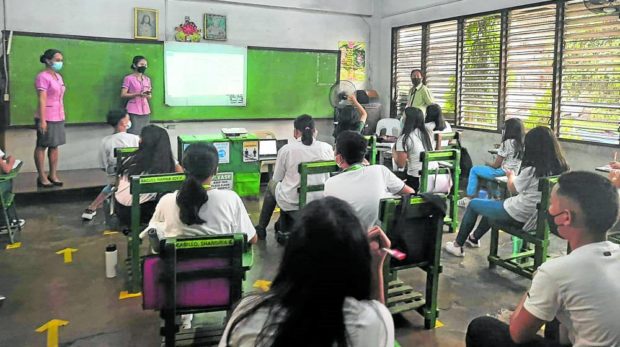Social factors must be considered in education reforms – psychologist

BACK TO CLASSROOMS | Several schools in Cebu City, like Abellana National High School, have been holding limited in-person classes for several months now. But Mayor Michael Rama on Wednesday allowed all local educational and training institutions to hold physical classes for all students due to the improving public health situation in the city. (File photo by NESTLE SEMILLA / Inquirer Visayas)
MANILA, Philippines — While curriculum and instruction enhancement is important to improve the quality of learning in the country, social and psychological factors must also be considered in implementing reforms, according to a researcher from De La Salle University (DLSU).
“Low achievement in reading is a product of poverty context,” Allan Bernado, an educational psychologist, said at the recently held 44th Annual Scientific Meeting.
The DLSU team used machine learning approaches to analyze the results of the reading data from the 2018 Programme for International Student Assessment (Pisa), in which they found that majority of Filipino students who did not fare well on the reading proficiency test came from low-income households.
Bernardo pointed out that socioeconomic status was associated with important factors such as the lack of access to ICT resources, the students’ learning motivation, and their expected occupational status.
“When they go to the classroom, they bring a low motivational set … they don’t like reading, they don’t feel like they value schooling and succeeding,” he said.
Article continues after this advertisement“They also have teachers who lack enthusiasm and make them feel bad for not being able to read,” Bernardo said, adding that the larger school environment causes the students to have a “low sense of belongingness.”
Article continues after this advertisementThese factors, then, contribute to threatening the poor readers’ sense of competence and belongingness.
“In a psychological sense, when you put them in this environment, they’re not going to be engaged, they’re not going to be motivated to learn. Instead, they will engage in behaviors that we consider to be avoidant,” he said.
“They will distance themselves from the academic goals, they will even engage in self-protective behaviors,” he added.
Among the classroom interventions proposed by the researchers include more engaging learning activities, less threatening feedback, and assessment, more cooperation versus competition, growth mindset interventions, and promotion of high standards and aspirations.
RELATED STORY
Bongbong Marcos wants education curriculum review to fix job mismatch